Why Does Catnip Make Kitties Crazy? The Reasons Still Baffle Scientists
Anyone who’s ever been around a kitty when she’s had a wee nip (of catnip, that is,) knows it alters feline behaviour considerably.
A formerly standoffish, independent creature may suddenly become downright silly, playing with all manner of string, meowing like mad, rolling around in the grass and basically acting like a stoned, goofy kitten.
These regal creatures suddenly become, well, very “un-cat” like.

Whether they discover catnip growing in the wild or an owner “doses” the animal to help them relax and have some fun, there’s no doubt that when kitties get catnip, they become entirely different critters, at least temporarily.
But what is it about this plant, compared to any other wild grass, that drives cats to the edge of kookiness? Scientists just aren’t sure.
It is a question that has bedevilled experts ever since they realized that there’s something about the herb that makes kitties go bonkers.
Catnip is actually a mint, part of the same family that includes basil and oregano. It contains compounds that scientists reckon are responsible for kitty’s change in mood, particularly a substance called nepetalactone.

This attaches itself to kitty’s neurotransmitters, inducing a kind of euphoria, but animal behaviour specialists aren’t entirely sure why it affects her the way it does.
Some cats were once thought to be less affected by catnip than others, but now scientists say virtually all of them are, at least to some degree.
According to Dr. Bruce Kornreich, associate director for education and outreach at the Feline Health Centre at Cornell University’s College of Veterinary Medicine, cats respond to catnip the way people respond to certain drugs, like marijuana.
But there is no concrete information — yet — that fully explains why it affects them the way it does, and yet it doesn’t affect other mammals, say dogs, or even humans.
Just as a person who has imbibed alcohol or used an opiate like cocaine changes drastically, so a kitty becomes markedly different from her usual self. But they don’t affect users in the same way, researchers say — in other words, kitty isn’t actually stoned.
And while scientists used to believe some cats are not affected by catnip, Kornreich says that a 2017 study belied that perspective.

“It used to be believed,” he explained, “that about two-thirds of adult cats respond — cheek rubbing, rolling on the ground, vocalizing.”
But some felines, he added, seem to respond differently during the study. “They assume what’s called a kind of sphinx position, and they vocalize less,” according to the results of that study. It suggests that, Kornreich added, “that a much higher percentage of cats — if not all cats — are somehow affected by catnip.”
Cats are attracted by the odour of catnip, apparently, not the taste, even though they will chew on toys containing it and roll around in a bowl of dried catnip if given half a chance.
Jim Simon, professor of plant biology and co-director of the Centre For Sensory Science and Innovation at Rutger’s University in New Jersey, said that, “they become playful and get agitated, they get excited, and then they go to sleep.
But there’s no information to show that catnip is operating the same way that medical cannabis, marijuana or cocaine does.”

Those drugs, to a greater or lesser degree, can potentially cause great harm to the human brain, whereas catnip seems to do no damage to cats whatsoever. Kitty gets buzzed, then goes to sleep, with no ill effects afterwards.
The effects of catnip on felines continue to confound scientists and researchers, but one thing is certain: it isn’t just domestic cats who love the stuff — wild cats, like lions and cougars, react to it as well.
They may not become gentle enough to pat, but they roll around and roar, just like their smaller feline relatives do.
In fact, some hunters use bundles of catnip to lure large cats into traps, to make them more docile so they can be moved from an area if they are endangering humans.
https://www.youtube.com/watch?v=cmkNtrno2Ek
Cats pose many mysteries to the folks who study them, and of course to the people who own them.
Any cat owner will agree that they don’t really own their pet; the cat owns them, and they seem to be largely indifferent to their masters, unlike dogs, who offers unconditional love and affection.
This likely explains why catnip is a billion dollar product around the world — when allowed to enjoy it, cats briefly give the illusion that they are fun loving, affectionate creatures who aim to please.
Another Article From Us: Archaeologists Discovers Intact Roman Chicken Eggs In Great Britain
Then the catnip wears off, and they return to their maddeningly independent, cool-as-can-be selves, to their owner’s everlasting frustration.





